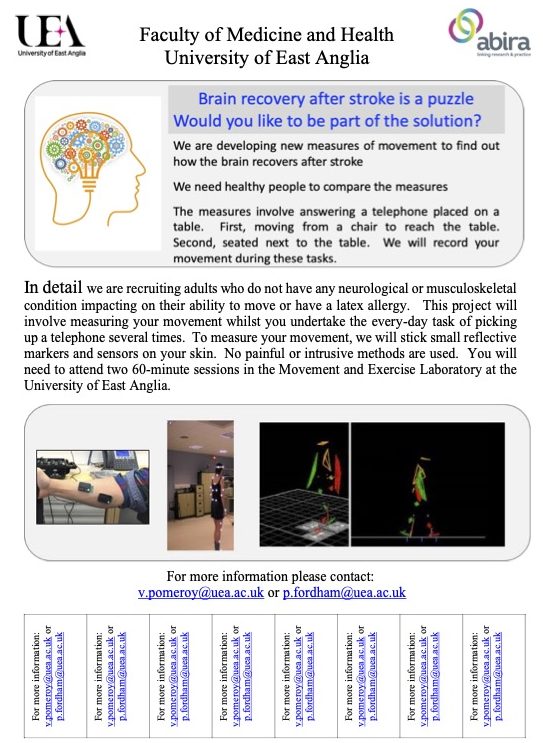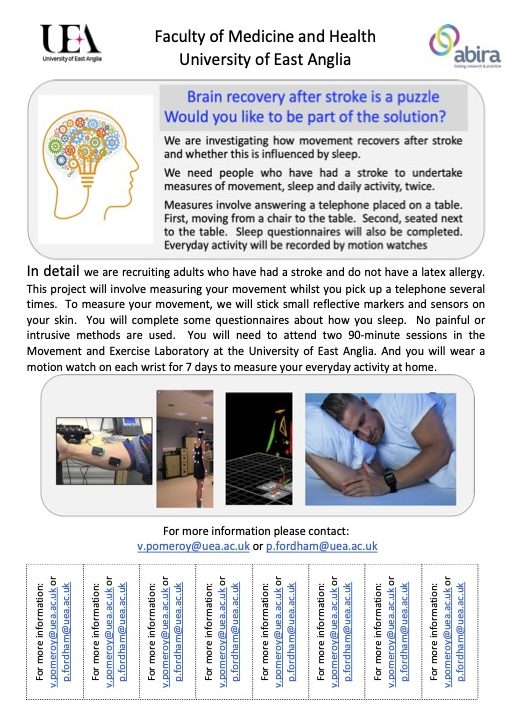Postgraduate Research Programmes
Postgraduate research is an important area of focus for ABIRA. Here are some of the projects our postgraduate students are undertaking.
Developing new measures of movement ability to improve personalisation of therapy for stroke survivors
Key Contact: Professor Valerie Pomeroy
Research Study team: Valerie Pomeroy, Canan Yuksel, Merve Kizilay, Elizabeth Chandler, Allan Clark, Nicola Hancock, Louise Gilbert, David Payne, Alpar Lazar
Read more +Key Contact: Professor Valerie Pomeroy
Research Study team: Valerie Pomeroy, Canan Yuksel, Merve Kizilay, Elizabeth Chandler, Allan Clark, Nicola Hancock, Louise Gilbert, David Payne, Alpar Lazar
Physical therapy is beneficial for improvement in the ability to move and function in everyday environments after stroke. The evidence base is strong. Despite these benefits, many people remain disappointed by their ability to move at six months and onwards after stroke and have requested better methods of rehabilitation. Increased benefit from physical therapy is promised from a stronger emphasis on driving neuroplasticity in the brain to produce motor recovery (use of pre-stroke movement patterns) rather than behavioural compensation (use of alternative movement patterns) .
Driving brain neuroplasticity to produce motor recovery requires use of measures of movement patterns in both research and clinical practice. The measures of movement patterns, neuro-mechanics, are derived from motion analysis of body segments and analysis of muscle activity using surface electromyography (EMG). For relevance to stroke survivors’ everyday lives these neuro-mechanical measures are made during the performance of standardised everyday functional tasks such as reach-to-grasp and sit-to-walk. Interpretation of these neuro-mechanical measures needs to be undertaken with reference to normative values obtained from a sufficient number of adults who do not have a neurological or other pathology that impacts their movement ability (healthy adults). This project will produce the required normative values in the UEA MoveExLab using the gold-standard data capture systems: Delsys surface-EMG, Brain Products EEG system and Vicon motion analysis.
We are recruiting adults who do not have any neurological or musculoskeletal conditions. If you would like to volunteer to take part in this study, please contact Professor Valerie Pomeroy, v.pomeroy@uea.ac.uk or Pel Fordham, Research Administrator, p.fordham@uea.ac.uk
Relationship between neuromuscular recovery, functional ability and sleep after stroke and criterion validity of measures made by the Vicon and Biokido motion analysis systems
Key Contact: Professor Valerie Pomeroy
Research Study team: Valerie Pomeroy, Canan Yuksel, Merve Kizilay, Elizabeth Chandler, Allan Clark, Nicola Hancock, Louise Gilbert, David Payne, Alpar Lazar
Read more +Key Contact: Professor Valerie Pomeroy
Research Study team: Valerie Pomeroy, Canan Yuksel, Merve Kizilay, Elizabeth Chandler, Allan Clark, Nicola Hancock, Louise Gilbert, David Payne, Alpar Lazar
Physiotherapy is beneficial for recovery of movement after stroke. Even greater benefit from physiotherapy is promised from a stronger focus on restoring pre-stroke movement patterns rather than using alternative movement patterns. Greater understanding of relative contribution of recovery of pre-stroke and alternative movement patterns is expected to inform identification of targets for even better physiotherapies.
Sleep is another factor that could influence recovery of movement. So a greater understanding of the relationship between sleep patterns and recovery of pre-stroke movement patterns is also expected to inform the development of even better physiotherapies.
For this research, we are recruiting stroke survivors who have been discharged from in-patient care (community-dwelling). If you would like to volunteer to take part in this study, please contact Professor Valerie Pomeroy, v.pomeroy@uea.ac.uk or Pel Fordham, Research Administrator, p.fordham@uea.ac.uk
Stroke Association Postgraduate Fellowship awarded to Helen Morse
Helen Morse has been awarded a three-year Stroke Association postgraduate fellowship to explore the feasibility of using a home-based computerised and assessment tool for spatial neglect post-stroke. For more information, please click here.
Read more +Helen Morse has been awarded a three-year Stroke Association postgraduate fellowship to explore the feasibility of using a home-based computerised and assessment tool for spatial neglect post-stroke. For more information, please click here.





